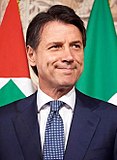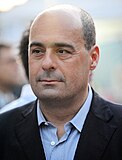2016 Etrurian federal election: Difference between revisions
No edit summary |
No edit summary |
||
| Line 117: | Line 117: | ||
Francesco Carcaterra became President of Etruria the next day with a sizeable majority in both houses of the federal legislature. The result also marked the first time a {{wp|far-right}} {{wp|populism|populist}} political party had been elected into government since the [[Etrurian Revolutionary Republic|functionalist era]]. | Francesco Carcaterra became President of Etruria the next day with a sizeable majority in both houses of the federal legislature. The result also marked the first time a {{wp|far-right}} {{wp|populism|populist}} political party had been elected into government since the [[Etrurian Revolutionary Republic|functionalist era]]. | ||
== Electoral process == | |||
Werania has since 1908 used an single non-transferable vote in multi-member districts to send 545 representatives to the Volkstag. The current electoral boundaries were approved in 2010 by the Electoral Board, with boundaries being decided every 10 years based on census data. Should a party have 273 or more representative in the Volkstag, it has an absolute majority and could thus govern autonomously, without a coalition partner. The constitution can be amended with a supermajority of two-thirds, or 360 deputies. | |||
Voters have to registrar to vote by the 28 April. In order to be eligible to vote one must be over the age of 18, be a citizen of Werania, have a permanent address in Werania and not be currently in prison. | |||
== Background == | |||
== Political parties == | |||
== Campaign == | |||
== Opinion polls == | |||
=== Exit poll === | |||
== Results == | |||
[[Category:Etruria]] | |||
Revision as of 21:18, 4 June 2019
| |||||||||||||||||||||||||||||||||||||||||||||||||||||||||||||||||||||||||||||||||||||
All 680 seats in the Chamber of Representatives and All 290 seats in the State Council | |||||||||||||||||||||||||||||||||||||||||||||||||||||||||||||||||||||||||||||||||||||
|---|---|---|---|---|---|---|---|---|---|---|---|---|---|---|---|---|---|---|---|---|---|---|---|---|---|---|---|---|---|---|---|---|---|---|---|---|---|---|---|---|---|---|---|---|---|---|---|---|---|---|---|---|---|---|---|---|---|---|---|---|---|---|---|---|---|---|---|---|---|---|---|---|---|---|---|---|---|---|---|---|---|---|---|---|---|
| Turnout | 34,730,414 (78.40%) | ||||||||||||||||||||||||||||||||||||||||||||||||||||||||||||||||||||||||||||||||||||
| |||||||||||||||||||||||||||||||||||||||||||||||||||||||||||||||||||||||||||||||||||||
| |||||||||||||||||||||||||||||||||||||||||||||||||||||||||||||||||||||||||||||||||||||
General elections were held in the United Transestrurian Federation for both houses of the Senate of the Federation on the 10 August 2016. All 680 and 290 members of the Chamber of Representatives and State Council respectively, were elected under a single non-transferable vote system in multi-member electoral districts.
The election saw the established two parties of the incumbent Etrurian Federalist Party, under President Andrea Reali and the Etrurian Socialist Party, under Matteo Fernandio Paruta suffer their worst defeats in history. The Tribune Movement under Francesco Carcaterra won a landslide victory, securing a majority in both houses of the Senate, while the Citizens' Alliance under Gianluca Tozzo made strong gains. The Workers and Farmers Union, under Milan Vučković and the Etrurian Greens under Fernando De Micheli making some gains.
Francesco Carcaterra became President of Etruria the next day with a sizeable majority in both houses of the federal legislature. The result also marked the first time a far-right populist political party had been elected into government since the functionalist era.
Electoral process
Werania has since 1908 used an single non-transferable vote in multi-member districts to send 545 representatives to the Volkstag. The current electoral boundaries were approved in 2010 by the Electoral Board, with boundaries being decided every 10 years based on census data. Should a party have 273 or more representative in the Volkstag, it has an absolute majority and could thus govern autonomously, without a coalition partner. The constitution can be amended with a supermajority of two-thirds, or 360 deputies.
Voters have to registrar to vote by the 28 April. In order to be eligible to vote one must be over the age of 18, be a citizen of Werania, have a permanent address in Werania and not be currently in prison.





